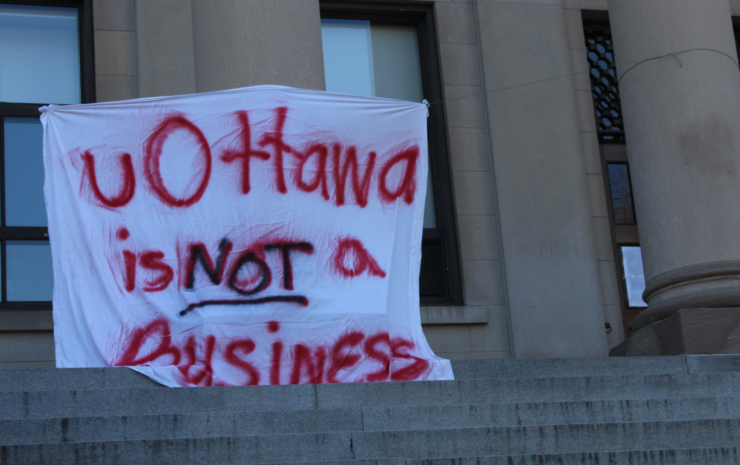Crises are not created equal, and the coronavirus pandemic is exemplary of this
Anti-mask, anti-vaccination, and anti-lockdown protests have plagued the streets of Ottawa throughout the course of the COVID-19 pandemic. Demonstrations of this nature have permeated roadways, hospital perimeters, and numerous public spaces — each time, unwelcome. My diagnosis? There is another virus spreading in our neighbourhoods: ignorance and unchecked privilege.
September 18 was a beautiful autumnal day. The sun was shining, it wasn’t too humid, and you could get away with shorts and a t-shirt: the perfect day to take a walk. If one did find themself strolling by Parliament that day, as I often like to do, their otherwise pleasant afternoon would have been rudely interrupted. Anyone taking a walk in the area that day expecting to hear birds chirping, people talking amongst themselves, and, albeit, also a fair amount of vehicular noise, instead would hear the cacophony of bells and chanting from an anti-masker protest.
It is astounding to me that a small piece of fabric on one’s face has resulted in this indefensible quantity of friction. Everyone wants to return to our old normal, sure. However, that is not possible without embracing our new normal. Masks, vaccine, and lockdown policies that mitigate the spread of this disease are integral to this process. While some are fundamentally perturbed by this supposed infringement on their rights, others are undergoing real, unwarranted injustices as a consequence of this pandemic.
Crises are not created equal, and the coronavirus pandemic is exemplary of this. The true victims of this contagion are not the ones rallying for their right to a root touch up, but rather the disproportionate number of warehouse, factory, and construction site workers that have not had the pleasure of working from home. While Alberta rolls out a “$100 COVID-19 vaccine incentive”, urging unwilling citizens to finally get vaccinated, many vulnerable countries like Bangladesh, Nepal, and Pakistan are struggling to acquire the number of vaccines they need.
Inequity in the consequences of COVID-19 is especially apparent in Canada. In Ottawa, the largest change I have experienced in grocery shopping is the rather helpful social distancing stickers in the checkout lineups — a welcome addition that I hope will remain post-pandemic. Well, that and the substitution of the 10 per cent student discount at the Loblaws on Isabella St. with a points reward system — you will be dearly missed.
However, Indigenous peoples living in remote communities can’t relate to such minimal changes: the expenditure of transporting food to these such areas increased by 400 per cent as a result of the pandemic. As a result, members of these communities are buying their groceries at an upcharge of 1.5 times the price. That is a price increase that many cannot afford. During a time where people are already experiencing new and difficult roadblocks, Indigenous peoples on remote reserves are suffering an unfair additional complication.
In order to understand the way privilege presents in the pandemic, one must understand that crises place strain on already existing inequalities. Social categories, such as race, class, age, and ability, intersect and influence the way phenomena of this nature affect populations. In short, COVID-19 is discriminatory.
For example, in June of 2020, it was found that 83 per cent of Toronto’s reported COVID-19 cases were comprised of Black Torontonians and people of colour. In an interview with CBC News, Dr. Eileen de Villa acknowledged the fact that the virus rears “a greater impact on those in our community who face greater health inequities.”
For me, the surmounting number of global COVID-19 casualties made concrete that being able-bodied in this pandemic is a privilege. However, the manner in which vulnerable populations have experienced a disproportionate degree of consequences solidifies this notion further. I condemn those that reject their personal responsibility in helping halt this virus in its tracks. Wearing a mask, getting vaccinated, and following provincial health orders is not too much to ask when it means that lives are being saved — and they are, according to various studies. If one really wants to put an end to these simple measures, the only worthwhile step one can take is simple: stop the spread.





